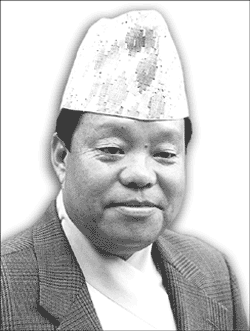(RNAC).
 Nepali Times: What is actually the problem at RNAC?
Nepali Times: What is actually the problem at RNAC? NS Pun: It has three major problems: too much political interference, weaknesses in ownership, and management problems.
In what way is ownership weak?
To operate an international airline you need money, there has to be capital injection. That was far short than what should have been. Up to now HMG has invested only Rs 370 million, and that too not as equity. That is not enough to run an international airline. So, either the government should inject capital as needed or sell off part of its ownership. The weakness is in financing.And who is interfering?
Every time there is a change in government, the airline's chairman and board are changed. The effect trickled down, as every new chairman shuffled staff. This affected staff morale. The end result is weak management.
Did your team see a way out?
The solution we have come up with is to reorganise the corporation under the Company Act. Let HMG keep a minimum percentage of shares, and sell the rest to financial institutions, tourism-related organisations and the general public. Let them run the show. We hope HMG takes a decision as soon as possible.
How much is the airline running in the red?
Its assets need to be re-evaluated. If you are to go in terms of its book value, then you can say that the company is bankrupt. It has no assets because the value of its depreciated assets is zero. If you look at its market value, then things are not as bad as we think. Total assets could be valued at around Rs 6-6.5 billion with its two Boeing 757, seven Twin Otters, ground equipment, spares and tools, and real estate and buildings. It also has intangible assets: flight operation permissions, traffic rights and even goodwill. Its loans are in the range of Rs 3-3.5 billion. So it is not facing real losses. However, in the past six-seven years it has had operational losses every year, and it has been forced to dig into assets to pay bills. If it continues to lose money, its assets will be eroded, the positive net worth we see today will become negative, and the airline will collapse. The government needs to step in before that happens.
You were junior minister of tourism once, just how bad is the political interference?
The management had become subservient to the minister and to ministry officials. That is the major problem RNAC faces. In the course of the study, I asked them why they did not resist orders that were not in the interest of the corporation? I told them it was their fault because a minister is a political person and does not know what goes on in an airline. The only way to change that would be to take the professionals out of the sphere of influence of government and politicians.
How have RNAC staff reacted to your proposal?
They agree on most issues. But there is corruption within the airline as well, and during the course of the study top officials admitted that it was also a reason for the state the airline is in today. Even the directors say they are unable to control corruption within. We have mentioned that in our report. So, investment alone may not be the solution, management needs to be good, there has to be motivation, a work-plan. All this is only possible through a professional approach.
You went to the rescue of Necon last year, and then opted out. What happened?
I left the army after 22 years to work in Nepal's civil aviation sector because I believe that tourism is key to our development, and aviation is critical to develop the tourism industry. Necon was having major financial problems, and my friends there wanted me to come over and help.
So why did you leave?
They needed money immediately, which I put in. But for that, the airline would have been in a very bad situation. I stayed there for three or four months and went to the US to negotiate with Beechcraft to add two aircraft the fleet. I went to France and re-negotiated the lease rate with ATR. I was able to get it down from $72,900 per aircraft per month to $60,000. I also negotiated with the insurance companies and took some steps to raise the morale of the employees. But I am a politician now, and could not stay there forever. I left on my own account, but still have my investment there. I have not even taken a receipt.


